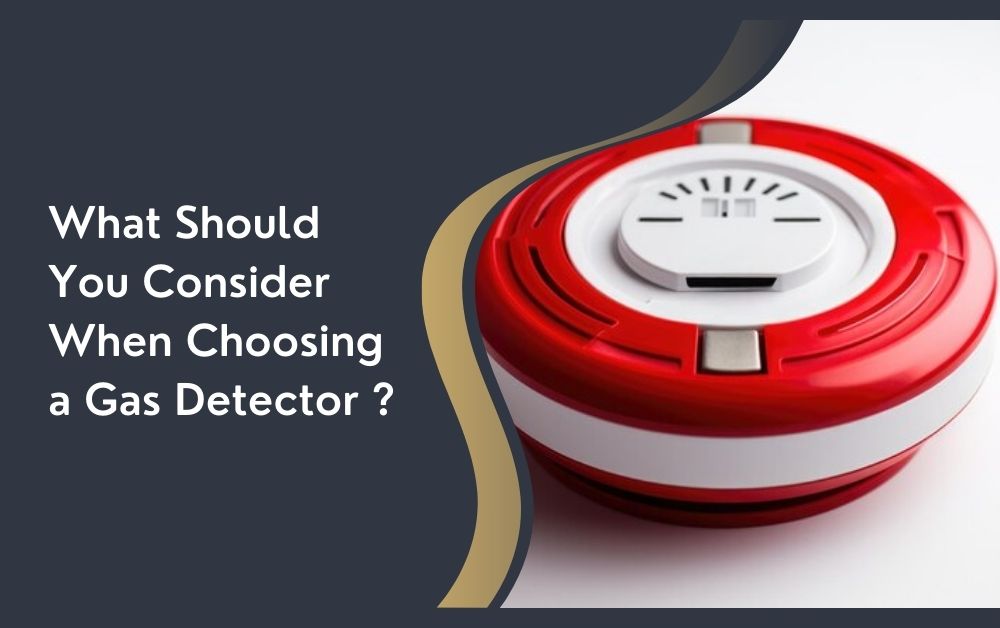Gas detectors are essential tools in ensuring safety in environments where gases could pose a hazard to life or property. From industrial settings to residential homes, the need for effective gas detection is widespread. This blog will walk you through the important considerations when choosing a gas detector, making sure you select a device that fits your specific safety needs and environment.
Understanding Gas Detectors
What is a Gas Detector?
A gas detector is a device that senses the presence of gases in an area, often as part of a safety system. This type of equipment is used to detect a gas leak or other emissions and can interface with a control system so a process can be automatically shut down. Gas detectors can also sound an alarm to operators in the area where the gas leak is occurring, giving them the opportunity to leave. This device will generally use a sensor to detect gas.
Types of Gas Detectors
Gas detectors come in various types, each suited for specific environments and gases:
- Single-Gas Detectors: These are designed to detect only one type of gas. They are typically used where there is a known hazard or to monitor for a specific type of gas.
- Multi-Gas Detectors: These can detect several types of gases at once and are useful in environments where multiple gases could pose a risk.
- Fixed Gas Detectors: Installed in a specific location, these detectors provide continuous monitoring in areas like laboratories or industrial plants.
- Portable Gas Detectors: These are carried by individuals or placed in areas temporarily to detect gas leaks at various locations.
Key Factors to Consider When Choosing a Gas Detector
Type of Gas to Detect
The first step in choosing a gas detector is to identify the type of gas you need to monitor. Different sensors are calibrated for specific gases, such as carbon monoxide, methane, propane, or natural gases. Knowing the types of gases present in your environment is crucial in selecting the right detector.
Sensitivity and Accuracy
Sensitivity
The sensitivity of a gas detector refers to the minimum concentration of a gas it can detect. A highly sensitive detector can identify even the smallest trace of gas, which is critical in preventing accidents.
Accuracy
Accuracy is just as important, ensuring that the readings are correct and reliable. An inaccurate gas detector might fail to alert users in time or cause false alarms, which can be disruptive and costly.
Durability and Environmental Conditions
Harsh Environments
If you plan to use the gas detector in harsh environments—like areas with high humidity, varying temperatures, or exposure to dust and debris—ensure the device is robust enough to handle these conditions without malfunctioning.
Water and Dust Resistance
Look for detectors with appropriate protection ratings for dust and water resistance, especially if they will be used outdoors or in other challenging environments.
Ease of Use and Maintenance

User-Friendliness
The gas detector should be easy to use, with a clear display and simple controls. Workers need to be able to operate the device quickly and effectively in an emergency.
Maintenance Needs
Consider the maintenance required to keep the gas detector operational. Some devices need regular calibration or sensor replacement. Understanding these needs upfront can help in managing the total cost of ownership and ensuring the device remains reliable.
Features and Functionality
Alarms and Alerts
Check the types of alarms and alerts the device offers. Effective gas detectors should have visual, audible, and possibly vibratory alarms to alert users about the presence of hazardous gases.
Data Logging
For many industrial applications, recording data about gas exposure over time is crucial. If you need to track data or generate reports, look for a gas detector with data logging capabilities.
Connectivity
Some modern gas detectors offer connectivity features like Bluetooth or Wi-Fi, allowing them to interface with other safety systems or mobile devices. This can be useful for remote monitoring and data management.
Certification and Standards Compliance
Safety Standards
Ensure that the gas detector meets relevant safety standards and certifications. These standards indicate that the device has been tested and meets certain safety and performance criteria.
Regulatory Compliance
Depending on your location and industry, there may be specific regulations governing the use of gas detectors. Make sure any device you consider complies with these regulations to avoid legal issues and ensure workplace safety.
Conclusion
Choosing the right gas detector is a critical decision that can significantly impact safety in your workplace or home. By considering the type of gas, sensitivity, environmental conditions, ease of use, and regulatory compliance, you can select a gas detector that meets your needs and provides reliable protection. Remember, the goal of using a gas detector is to ensure safety by preventing hazardous exposures and accidents. Take the time to evaluate your specific requirements and select a device that fits those needs closely.
Note:- To read more articles visit on insighthubster.
